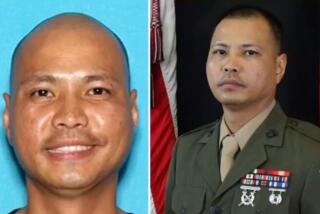Twilight Beneath an Overpass
- Share via
FALLOUJA, Iraq — The wounded Marine lay on an olive-drab stretcher placed gently in the dirt and rocks beneath a freeway overpass. There had been other casualties, and the dirt was littered with discarded surgical gloves and tourniquets.
Above, Marine and Army vehicles raced along Highway 1, which leads to Baghdad. Last year, the 1st Marine Division had powered down the road in its rush to topple Saddam Hussein. This time, reinforcements were rushing to fight the insurgents in Fallouja.
The Marine had been wounded in the head in the final minutes of the battle for a Fallouja mosque. Whether he was hit by small-arms fire or a rocket-propelled grenade was unknown.
His head was swathed in bandages, but the blood seeped through from the wound in his left temple, a blossoming crimson stain on the white fabric.
Kneeling over his stretched-out body, Navy doctors and medical corpsmen, backed by Marine guards to protect them from hostile fire, worked feverishly on the Marine.
Orders were barked out. Clamps, gauze, intravenous solutions, everything in a fully stocked medical supply truck was being used.
A sergeant sternly demanded that reporters move back. Another sergeant arrived a minute later to tell reporters that the Marine “was being worked on by the docs and he’s going to be fine.” The tone and quaver of his voice showed that was untrue.
The work continued, more clamps, more this, more that. More barked orders. In the distance, the Marine tanks, the Air Force jets and the insurgents’ mortar fire could be heard. As trucks passed overhead, the concrete pillars of the overpass trembled slightly and a light rain of dirt fell on the medical personnel and Marines below. Light was failing and night arriving.
For 40 minutes, work on the wounded Marine continued. Then it stopped. Tubes and clamps were removed. An anguished call went out for a chaplain, but the chaplain was miles away.
Still kneeling, the doctors, corpsmen and Marines draped their arms over their buddies’ shoulders and leaned forward over the Marine’s body, in a kind of huddle.
Marines who had watched from atop their vehicles nearby became quiet. Some had tears in their eyes.
Navy Lt. Cormac O’Connor, a boyish-looking doctor from Indiana, pronounced the Marine dead and led a prayer asking God to help his family through the grief that would soon descend on them. After the hushed prayer was said, and the Marines and corpsmen had separated, nothing more was said for several moments.
Then came a voice, maybe a corpsman’s, maybe a Marine’s, saying: “OK, let’s get this area cleaned up. We have work to do.” The body was put in a large, rubber bag and taken away.
More to Read
Sign up for Essential California
The most important California stories and recommendations in your inbox every morning.
You may occasionally receive promotional content from the Los Angeles Times.













